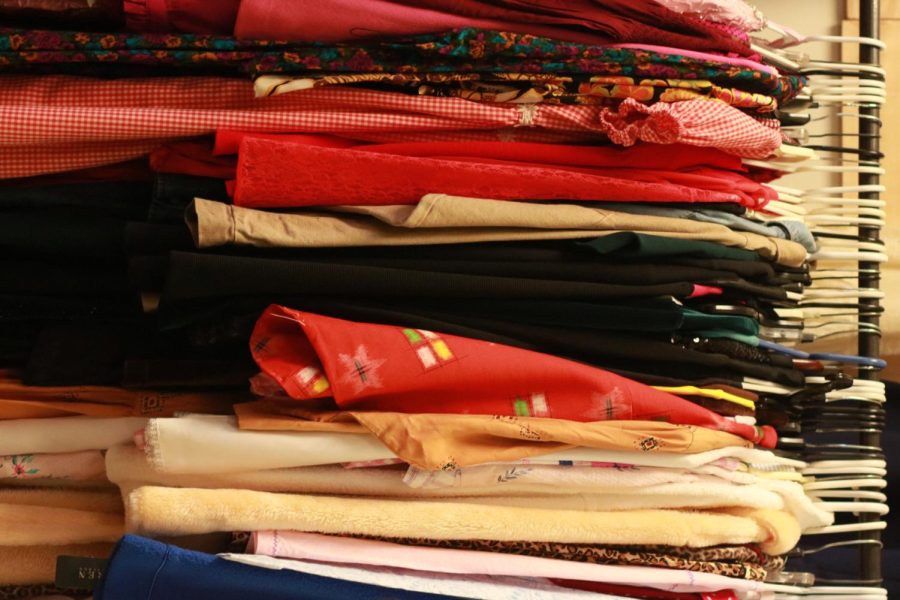Thrift stores: bringing new life to used clothes and the environment
Cheap clothing stores like Forever 21 and online boutiques like Shein have made shopping as easy as the click of a button, literally.
They are popular shops in the “fast fashion” industry, where companies mass produce trendy clothing pieces at low costs. However, this convenience comes with a price, paid for by the environment through excess waste and carbon emissions.
But, there is a simple solution: thrift stores.
Second-hand shops feature new and old treasures, no shipping and handling fee required. Einstein’s Attic, located in the Acme Plaza in Kent, is one of these sustainable thrift stores, selling items owner Sherry Dakes and her team finds at auctions and estate sales.
“Thrift stores give people the opportunity to recycle items,” Dakes said. “We like to sell a lot of older clothes because years ago, clothes were a lot better made. The fabrics and materials were much nicer than they make today, which is also why a lot of people like to shop at thrift stores. Because of places like ours, we can put up items for resale instead of throwing them into a landfill.”
The fashion industry generates large amounts of waste, causing many tons of clothing to be even incinerated, adding more carbon emissions into the air.
The U.S Environmental Protection Agency estimates that 85% of textiles end up in landfills every year, which equates to 82 pounds of clothing per person.
Dakes attributes these high numbers to the lack in quality of today’s clothing pieces.
“There are so many items today that are made to be disposable,” Dakes said. “Older clothes and other items were made to last so people could reuse them over and over. That is one sad thing that companies do during this decade that did not happen many years ago.”
As people become more interested in a greener world through thrift shopping, they help to combat the excess waste caused by popular clothing stores today.
Sophomore fashion merchandising major Ranait McGuire is a frequent thrift store customer and runs the fashion blog “The Environista,” which is centered around sustainable fashion.
McGuire sees thrift stores as a lifeline for the environment.
“Thrift stores are a great way to shop sustainably,” McGuire said. “Because everything there is second-hand, the consumer is giving the garment another life. By donating your clothes to a thrift store instead of throwing them in the trash, you are helping to eliminate the buildup of clothing that typically goes to waste.”
In its 2021 report, the World Economic Forum named the fashion industry as the world’s third largest polluter, also publishing that to eliminate these carbon emissions, companies must work on their recyclability.
As this information has become more widely available, people have flocked to thrift stores to do their part.
“My passion for helping the environment honestly didn’t become this intense until my freshman year at Kent,” McGuire said. “Through my studies I was exposed to just how bad the fashion industry had gotten. Issues like “fast fashion” have gotten out of control, and I realized people weren’t even understanding the repercussions of their actions.”
Einstein’s Attic has also seen the effect of the continuous research into unethical fashion. Today, the store sees around 40 customers a day.
“It seems like when we first opened, some people were hesitant to shop at second-hand stores, but in the past six or seven years, more people want to shop here than department stores,” Dakes said. “This is because people today are more involved with the environment. They want to save it and keep it green by not disposing of things as much.”
While the convenience of shopping from “fast fashion” companies can outweigh the commitment of ethical shopping, even small decisions can make a big impact on the environment if done repeatedly.
“No one is perfect, and larger changes to the environment cannot be made overnight,” McGuire said. “However, doing small things like donating your clothes instead of throwing them away or making an effort to buy second-hand will make a difference. If we all come together and begin to shift our consuming habits, a huge impact can be made.”
Isabella Schreck is a reporter. Contact her at [email protected].



